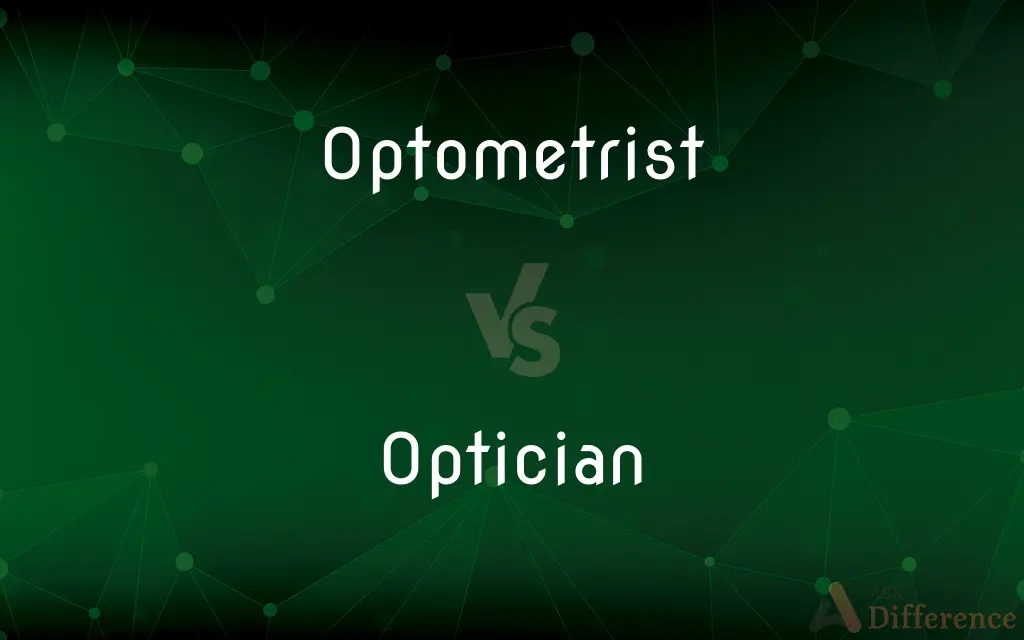Optometrist vs. Optician — What's the Difference?
By Fiza Rafique & Maham Liaqat — Updated on March 14, 2024
Optometrists are eye care professionals who provide primary vision care, while opticians specialize in fitting and dispensing eyewear.

Difference Between Optometrist and Optician
Table of Contents
ADVERTISEMENT
Key Differences
Optometrists are healthcare professionals trained to perform eye exams, diagnose vision problems, and prescribe corrective lenses. They have a Doctor of Optometry (OD) degree, which involves undergraduate education followed by four years of professional training in optometry. Opticians, on the other hand, are technicians specialized in fitting eyeglasses and contact lenses based on prescriptions from optometrists or ophthalmologists. They do not perform eye exams or diagnose eye conditions but focus on the technical aspects of eyewear fitting and adjustments.
While optometrists can prescribe medications for certain eye conditions and perform minor surgical procedures in some regions, opticians are primarily focused on the practical side of vision correction. This includes selecting frames, adjusting eyeglasses for a proper fit, and instructing patients on how to care for their eyewear. Optometrists, however, provide a broader scope of eye care services that encompass vision care, eye health assessments, and management of eye diseases.
Education and training distinguish these professions significantly. Optometrists undergo extensive education that includes a doctoral degree in optometry, whereas opticians typically complete a combination of post-secondary education and hands-on training or an apprenticeship. Some regions require opticians to be licensed, which involves passing an exam and meeting continuing education requirements.
The role of an optometrist in patient care involves conducting comprehensive eye exams, prescribing eyeglasses and contact lenses, and assessing patients' overall eye health. They may also manage and treat conditions like glaucoma, macular degeneration, and diabetic retinopathy. Opticians, while they do not assess eye health, play a crucial role in ensuring that the eyewear prescribed by optometrists or ophthalmologists is correctly fitted to the patient, which is essential for effective vision correction.
In the patient care continuum, optometrists and opticians often work closely together within the same practice or optical shop. Optometrists determine the patient's vision correction needs through examinations and diagnoses, while opticians execute the optometrist's prescriptions by providing patients with the appropriate eyewear solutions tailored to their specific requirements.
ADVERTISEMENT
Comparison Chart
Profession
Eye care professional providing primary vision care.
Technician specializing in fitting and dispensing eyewear.
Education
Doctor of Optometry (OD) degree.
Post-secondary education and training/apprenticeship.
Services
Eye exams, diagnoses, prescriptions, minor surgical procedures.
Fitting eyeglasses/contact lenses, adjustments, eyewear care.
Prescription
Can prescribe eyeglasses, contact lenses, and medications.
Cannot prescribe; works from prescriptions provided by others.
Scope
Broad: vision care, eye health assessments, disease management.
Narrow: technical aspects of eyewear fitting and adjustments.
Patient Interaction
Direct: conducts exams, diagnoses conditions, prescribes treatment.
Indirect: focuses on implementing another professional's prescription.
Compare with Definitions
Optometrist
Primary eye care provider who diagnoses and treats vision problems.
The optometrist diagnosed her with myopia and prescribed corrective lenses.
Optician
Limited to technical aspects of eyewear.
Opticians focus on the precise fitting and customization of eyewear.
Optometrist
Can prescribe eyewear and medications for eye conditions.
The optometrist prescribed antibiotic drops for the eye infection.
Optician
Technician who fits and dispenses eyeglasses and contact lenses.
The optician helped her choose frames and fitted her glasses.
Optometrist
Requires a Doctor of Optometry (OD) degree.
After completing his undergraduate degree, he pursued an OD to become an optometrist.
Optician
Works with prescriptions provided by optometrists or ophthalmologists.
The optician filled the prescription for bifocal lenses.
Optometrist
Offers comprehensive eye exams and vision care.
The optometrist performed a thorough eye examination to assess both vision and eye health.
Optician
Specializes in eyewear fitting, adjustments, and maintenance.
The optician adjusted the glasses to ensure a comfortable fit.
Optometrist
Broad, covering various aspects of eye health.
Optometrists manage everything from routine vision correction to treating eye diseases.
Optician
Involves post-secondary training or apprenticeship.
He completed a two-year opticianry program to become a certified optician.
Optometrist
A person who practises optometry.
Optician
An optician, or dispensing optician, is a technical practitioner who designs, fits and dispenses lenses for the correction of a person's vision. Opticians determine the specifications of various ophthalmic appliances that will give the necessary correction to a person's eyesight.
Optometrist
A person who is professionally trained and licensed to examine the eyes for visual defects, diagnose problems or impairments, and prescribe corrective lenses or provide other types of treatment.
Optician
A person qualified to prescribe and dispense glasses and contact lenses, and to detect eye diseases (ophthalmic optician) or to make and supply glasses and contact lenses (dispensing optician).
Optometrist
A person trained and skilled in examining and testing the eyes for defects, in order to prescribe corrective lenses or treatment.
Optician
One that makes lenses and eyeglasses.
Optometrist
One who is skilled in or practices optometry, especially one who examines the eyes for defects in vision and prescribes the proper lenses to correct any defects discovered.
Optician
One that sells lenses, eyeglasses, and other optical instruments.
Optometrist
A person skilled in testing for defects of vision in order to prescribe corrective glasses
Optician
A person who makes or dispenses lenses, spectacles.
Optician
A person who sells lenses, spectacles etc.
Optician
One skilled in optics.
Optician
One who deals in optical glasses and instruments.
Optician
A worker who makes glasses for remedying defects of vision
Common Curiosities
Can an optician prescribe contact lenses?
No, opticians cannot prescribe contact lenses; they dispense and fit them based on a prescription from an optometrist or ophthalmologist.
How do I know if I need to see an optometrist or an optician?
If you need an eye exam, diagnosis, or treatment for vision problems, see an optometrist. If you need to fill a prescription for glasses or need eyewear adjustments, see an optician.
Do opticians need to be licensed?
Licensing requirements for opticians vary by region, with some areas requiring formal education, training, and passing a licensing exam.
How often should I see an optometrist?
It's recommended to have a comprehensive eye exam every 1-2 years, depending on your age, risk factors, and whether you currently wear corrective lenses.
Can an optometrist perform eye surgery?
Optometrists can perform certain minor surgical procedures, but major eye surgeries are typically performed by ophthalmologists.
Can an optometrist treat eye diseases?
Yes, optometrists can diagnose, treat, and manage various eye diseases, though the scope can vary by jurisdiction.
Can an optometrist and an optician work in the same practice?
Yes, many practices include both optometrists and opticians, providing a full range of eye care services from exams to dispensing eyewear.
What's the difference between an optometrist and an ophthalmologist?
An ophthalmologist is a medical doctor who specializes in eye and vision care, including performing eye surgery, which goes beyond the scope of an optometrist's practice.
What kind of training do opticians receive?
Opticians typically complete a diploma or associate degree program in opticianry, which includes both classroom instruction and hands-on clinical training.
Can opticians detect eye problems?
While opticians are skilled in fitting eyewear, they are not trained to diagnose eye health problems. Any concerns should be addressed by an optometrist or ophthalmologist.
How does an optometrist test for eye diseases?
Optometrists use a variety of tests and equipment, such as visual acuity tests, tonometry to measure eye pressure, and retinal imaging, to assess eye health and detect diseases.
What should I bring to an optician appointment?
Bring your current eyewear and any prescriptions from your optometrist or ophthalmologist to the optician.
Can optometrists provide emergency eye care?
Yes, optometrists can provide care for certain eye emergencies, such as sudden vision changes, eye infections, or foreign objects in the eye.
Do opticians design eyewear?
Opticians may not design eyewear, but they are knowledgeable about the latest styles and technologies and can recommend options based on your prescription and lifestyle needs.
Are there specializations within optometry?
Yes, optometrists can specialize in areas such as pediatric eye care, contact lenses, low vision therapy, and sports vision.
Share Your Discovery

Previous Comparison
Foal vs. Pony
Next Comparison
Goth vs. PunkAuthor Spotlight
Written by
Fiza RafiqueFiza Rafique is a skilled content writer at AskDifference.com, where she meticulously refines and enhances written pieces. Drawing from her vast editorial expertise, Fiza ensures clarity, accuracy, and precision in every article. Passionate about language, she continually seeks to elevate the quality of content for readers worldwide.
Co-written by
Maham Liaqat













































